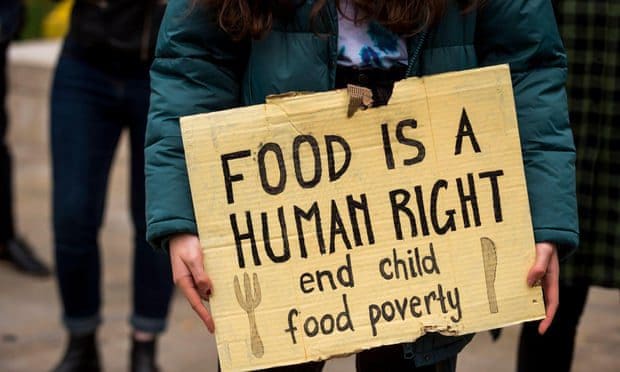Ensuring everyone has decent public services and a guaranteed income could transform the UK after the pandemic
Opinion by Anna Coote and Neal Lawson
As Britain’s economy and society gradually reopen, we face big questions about what should come next. The chancellor has promised tax rises and spending cuts. Without a radical response, increases in poverty, unemployment and inequality will be inevitable outcomes of the Covid crisis.
What’s needed now is a social guarantee that enshrines every person’s right to life’s essentials.
Most people will agree what these essentials are: education, healthcare, a decent home, care, food, clean air and water, energy, transport and (these days) access to the internet.
To ensure everyone has these essentials, people must have a fair living income and access to public services that meet their needs.
We expect to pay for some necessities ourselves. Food is an obvious example, so everyone must have enough money to afford a nutritious diet. There are other essentials that most of us couldn’t afford on our own. Think of education, healthcare, childcare and adult social care. Here, we ensure everyone has access by sharing responsibility, pooling resources and acting together.
Without providing these services collectively through public institutions, we would need vast amounts of cash to meet all of our needs.
Some people in policy circles have spent too long arguing whether “universal basic income” (UBI) or “universal basic services” (UBS) ought to be our preferred goal. But in fact we need both. Without public services, many people wouldn’t be able to afford to pay for their healthcare or education, and without a guaranteed income floor below which nobody can fall, far too many people would be condemned to poverty.
It’s best to think of these things as two sides of a coin.
On one side, we want to make sure that everyone has a secure and sufficient income. This would minimise the humiliation of claiming benefits, and reflect the reality that peoples’ income levels vary dramatically according to their different jobs, needs and conditions.
This calls for generous cash payments available according to need, through a system that is open-hearted and empowering, not hostile or begrudging.
On the other side of the coin are the services that are essential to live a good life, which people don’t pay for directly. These are worth much more to people on low incomes, so they help to reduce inequalities. They’ve been gravely undermined by a decade of austerity and will be in even greater danger if the vast costs of Covid-19 are used to justify more spending cuts. So they need defending, extending and transforming.
It’s not a matter of which option is preferable, but rather how each of them is realised in practice, and how they fit together and support each other.
A guaranteed income floor (one version of UBI) can be combined with more and better public services to provide secure foundations for everyone to flourish.
For that to work, the income floor must be set at a level that is sufficient, without absorbing public funds needed to maintain and improve services.
There’s no “magic bullet” for solving problems such as deepening poverty, widening inequalities, rising unemployment and the threats of future pandemics and climate breakdown. But we can make a decent start if we enhance public services and integrate them with a basic income as part of a new social guarantee. This guarantee would give everyone the right to a secure and sufficient income and to the services that meet their needs, regardless of their ability to pay.
It wouldn’t be a top-down, uniform model.
Services would be delivered through a wide range of organisations, from local councils and social enterprises to co-ops and charities. But all providers would be bound by the same set of principles and an obligation to serve the public interest.
People who use services, and public service workers, would be fully involved in planning and delivering them. Meanwhile, the main role of the state would be to ensure everyone has equal access to these things, to set and enforce standards, collect and distribute funds and coordinate different services to get the best results for those who need them.
This is a radical programme, but it’s also a pragmatic one. It can be implemented in stages, and questions such as which services people need most and what level of income is sufficient can be worked out democratically. Most importantly, a system that integrates cash and in-kind benefits will have transformative impacts. For one thing, it’s highly redistributive.
It would build a sense of shared responsibility and solidarity, because everyone contributes and everyone benefits. It would generate relatively secure public-sector employment at all skill levels, and would encourage the efficient use of public resources.
And because this social guarantee involves shared responsibility and collective action, rather than purely market-based transactions, it would be more able to support a concerted approach to climate action and ecological sustainability. So it’s time for progressives to throw their weight behind a social guarantee that combines income and services. A post-Covid society demands this level of vision, ambition and collaborative endeavour.
_____
Anna Coote is principal fellow at the New Economics Foundation and co-author with Andrew Percy of The Case for Universal Basic Services(Polity Books, 2020). Neal Lawson, director of Compass, set up the Basic Income Conversation
To see original article please visit: https://www.theguardian.com/commentisfree/2021/mar/11/post-covid-britain-new-social-guarantee-universal-basic-income-pandemic





















